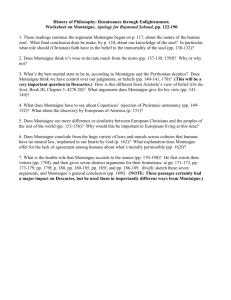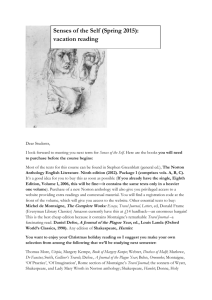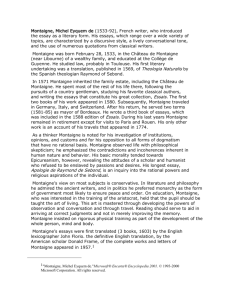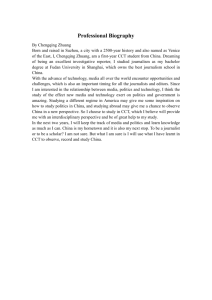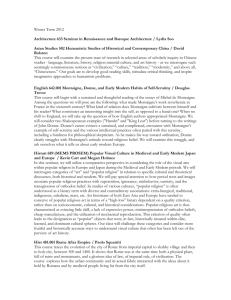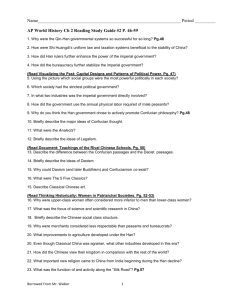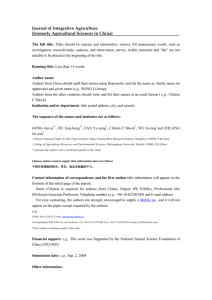Montaigne's Views on Death Compared to Attitudes Found in t
advertisement
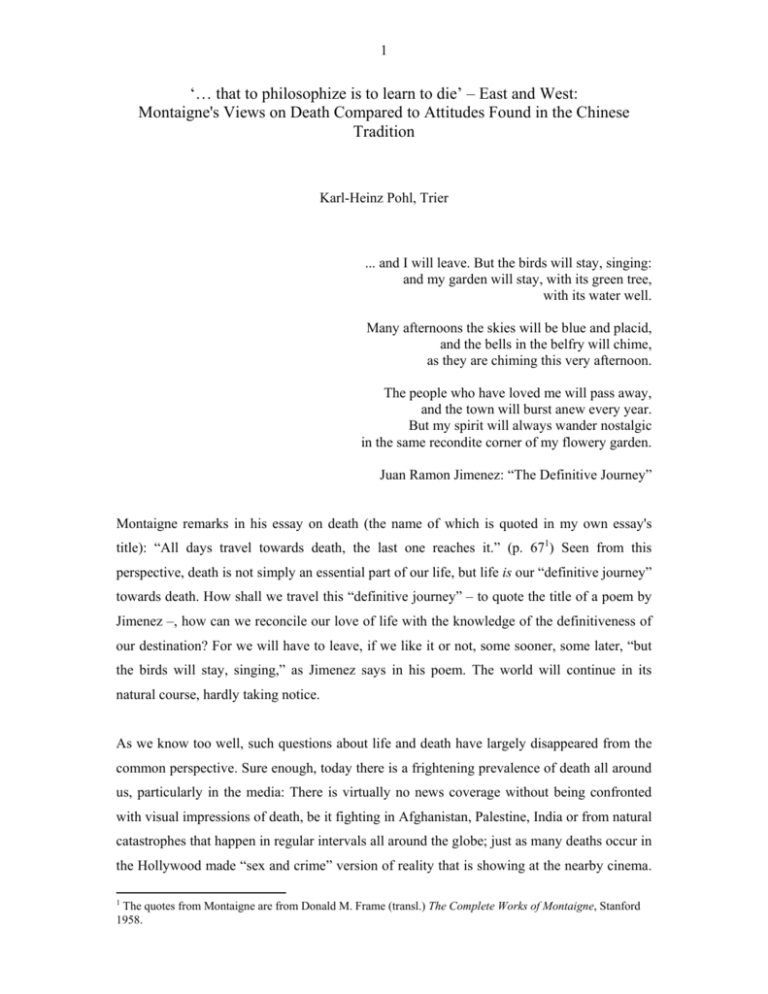
1 ‘… that to philosophize is to learn to die’ – East and West: Montaigne's Views on Death Compared to Attitudes Found in the Chinese Tradition Karl-Heinz Pohl, Trier ... and I will leave. But the birds will stay, singing: and my garden will stay, with its green tree, with its water well. Many afternoons the skies will be blue and placid, and the bells in the belfry will chime, as they are chiming this very afternoon. The people who have loved me will pass away, and the town will burst anew every year. But my spirit will always wander nostalgic in the same recondite corner of my flowery garden. Juan Ramon Jimenez: “The Definitive Journey” Montaigne remarks in his essay on death (the name of which is quoted in my own essay's title): “All days travel towards death, the last one reaches it.” (p. 671) Seen from this perspective, death is not simply an essential part of our life, but life is our “definitive journey” towards death. How shall we travel this “definitive journey” – to quote the title of a poem by Jimenez –, how can we reconcile our love of life with the knowledge of the definitiveness of our destination? For we will have to leave, if we like it or not, some sooner, some later, “but the birds will stay, singing,” as Jimenez says in his poem. The world will continue in its natural course, hardly taking notice. As we know too well, such questions about life and death have largely disappeared from the common perspective. Sure enough, today there is a frightening prevalence of death all around us, particularly in the media: There is virtually no news coverage without being confronted with visual impressions of death, be it fighting in Afghanistan, Palestine, India or from natural catastrophes that happen in regular intervals all around the globe; just as many deaths occur in the Hollywood made “sex and crime” version of reality that is showing at the nearby cinema. 1 The quotes from Montaigne are from Donald M. Frame (transl.) The Complete Works of Montaigne, Stanford 1958. 2 Possibly because of the flood of such images and through the distancing of the media the underlying message seems to be: This is something that doesn’t really concern us; death might be our fellow traveler in this world, but at the moment he must be somewhere else, he is certainly not in our company. Thus death appears to have vanished out of our personal life. But needless to stress here, this was not always so; the topic of death - and life - once was the topic of philosophy. It used to rank high on the agenda of some of the most venerated thinkers and poets of the classical age, both in China and the West, only to mention the philosophers of the Stoa in the period of Greek-Roman antiquity or Zhuang Zi in pre-Qin China. As we shall see, there is some common ground regarding the attitudes towards death between East and West – at least in the small segment discussed in this essay. But we will also find a few interesting differences. In the following, I shall first discuss the views on death in Confucian and Daoist philosophy and compare them with Michel de Montaigne’s attitude about death as expressed in his essay “That to philosophize is to learn to die” - a late (16th century) but inspiring example of the Stoic treatment of death. Having begun with a modern Western poem, I shall end with some verses and ideas from poems on death by the Daoist inspired poet Tao Yuanming (5th century A.D.). * Once we go beyond a ritual aspect2 of death (which would well deserve a separate study and presentation) we find that the views on death in both Confucian and Daoist philosophy have much in common: first of all, a disinterest in the afterlife and a stress on this worldly 2 Just as in all cultures, in China we, first of all, also find a complex system of ceremonies around death, including specific notions about the afterlife. For example, ancestor worship and burying rituals were of topmost concern - for the common people as well as for the intellectual elite. Prevalent were also ideas, influenced by Yin-Yang-thought, about two different “entities” in the human being: a spirit-like manifestation of the Yangforce (hun) and an earthly manifestation of Yin (po). At the point of death, these two “souls”, simply put, were supposed to separate, with the “spirit-soul” rising to heaven and the other sinking down into earth. Interestingly, these “souls” (if we may actually call them thus without confusing them with the corresponding Western notion) were not believed to possess eternal life, instead they were thought of returning in due time into the unbound ocean of cosmic energy (qi). For this reason, in the Zhou period, ancestor worship was limited to a few generations only (7 for the Emperor, 5 for the nobility, and 2 for the scholars and common folk). Although there were views on paradise and hell, these were - at least in the pre-Buddhist period - not well developed. See: Yu Yingshi, "Cong jiazhi xitong kann Zhongguo wenhua de xiandai yiyi" (Looking at the modern significance of Chinese culture from the perspective of its value system) in Yu Yingshi, Zhongguo sixiang chuantong de xiandai quanshi (A Modern Interpretation of the Chinese Tradition of Thought), Taibei 1987, p. 46f. See also Martin Miller, Die Modernität der Tradition: zum Kulturverständnis des chinesischen Historikers Yu Yingshi, Münster 1995, p. 115. 3 existence, second, the acceptance of death as destiny, and finally the notion that man forms a unity with Heaven and Earth (viz. the cosmos). As for the first aspect, disinterest in the afterlife, Confucius once responded to questions about serving the spirits of the dead and about death itself in the following way, “While you are not able to serve men, how can you serve their spirits? […] While you do not know life, how can you know about death?” (Analects, 11.123) Here we have an emphasis on the worldly life and a complete disregard for normal religious interests and metaphysical speculation. In contrast to the Daoists, the Confucian attitude towards death is determined mainly by moral categories. With their emphasis on rituals (li) together with filial piety (xiao), care for the parents not only while they are alive but also, when dead, trough elaborate funeral and mourning rites, the Confucians were the masters of burying ceremonies and as such administering death with all its rituality. But it is important to note that the significance of the burying rituals was also a worldly and moral one: They were meant to cultivate the attitude of the mourner and not to please otherworldly and unseen ghosts and spirits. The moral dimension in the Confucian attitude toward death has yet another side to it: defiance of death for the sake of the Dao – the “moral Way”. As Confucius is quoted: “If a man in the morning hears the right Way (Dao), he may die in the evening without regret.” (Analects, 4.8) Or: “With sincere faith, he [the right minded person] unites the love of learning, holding firm to death, he is perfecting the excellence of his course.” (Analects, 11.12) Hence it is a moral fortitude which lets man accept death without further qualms. From Mencius we have similar quotes; possibly best known and exemplary is the passage in which he compares the liking of fish and bear’s paws to the liking of life and righteousness, saying: I like fish, and I also like bear’s paws. If I cannot have the two together, I will let the fish go, and take the bear’s paws. So if I like life, and also like righteousness, if I cannot keep the two together, I will let life go, and choose righteousness. […] I dislike death indeed, but there is that which I dislike more than death, and therefore there are occasions when I will not avoid danger. (Mencius, 6A.10) Apart from this moral orientation, characteristical for the Confucian attitude towards death is a firm belief in Heaven as the ultimate source of human destiny: “Death and life have their 3 The quotes from the Confucian classics - "Analects" (Lunyu) and Mencius - are from James Legge, The Chinese Classics (in five volumes), Oxford 1893. 4 determined appointment (ming); riches and honours depend upon Heaven.” (Analects, 12,5) Or Mencius: “Death sustained in the discharge of one’s duties may correctly be ascribed to the appointment of Heaven.” (7A.2) Thus faith in the appointment of Heaven did not simply produce fatalism but rather a certain peace of mind and acceptance of death as the natural course of man. A lasting monument of this attitude – of Confucian equanimity in facing death – is the concluding thought in the famous “Western Inscription” of the Neo-Confucian philosopher Zhang Zai (12th cent.), saying: “In life I shall follow and serve [Heaven and Earth]. In death I will be at peace.”4 * As already said, the acceptance of death and disinterest in the afterlife is common to both Confucian and Daoist thought. But in Daoism, particularly in the work of Zhuang Zi, philosophizing about death reaches yet another – liberating - dimension. In the Zhuangzi (a text from the 4th – 3rd century B.C.), death is a reoccurring topic, particularly prominent in chapters 6 and 18. Some of the parables and anecdotes often have a few things in common, for example the setting that a visitor finds somebody mourning the death of a beloved one but not in the conventional way, instead he might be singing or beating the drum (as does Zhuang Zi himself at the death of his wife) or showing his disregard for the mournful situation in other ways. We may interpret this, first of all, as a sideswipe at the Confucians who, with their elaborate funeral rites, virtually were the masters of mourning rituals at Zhuang Zi’s time. But why not mourn the death of a beloved one? Zhuang Zi’s answer is that everything under Heaven has its time. Life and death are only part of the great workings of Heaven: “I received life because the time had come; I will lose it because the order of things passes on,” he says (ch. 6, p. 845). Accepting destiny, there is no reason to fear death, instead this acceptance leads to inner calmness and peace of mind. And so he says, “If you are content with the time and willing to follow along, then grief and joy have no way to enter in.” (ch. 3, p. 53). The resulting liberated state of mind is (twice) described as “freeing of the bonds (xi jie)” (ch. 3 and ch. 6, p. 53 and 84). Hence, the True Man has no preference about life and death: “He emerged without delight; he went back in without a fuss.” (ch. 6, p. 78). This equanimity 4 Wing-tsit Chan, A Source Book in Chinese Philosophy, Princeton 1969, p. 498. The quotes from Zhuang Zi are from: Burton Watson (transl.), The Complete Works of Chuang Tzu, New York 1968. 5 5 about life and death is more than just tranquillity but rather, as the term “freeing of the bonds” indicates, a state of mind that is liberated from any worldly anxieties. Death, as a realm of freedom, is described most effectively in the parable about Zhuang Zi finding a skull. After first considering the sad fate of the human being of which the skull is the only remains, the skull appears at night in Zhuang Zi's dream and enlightens him about death, saying: Among the dead there are no rulers above, no subjects below, and no chores of the four seasons. With nothing to do, our springs and autumns are as endless as heaven and earth. A king facing south on his throne could have no more happiness than this. (ch. 18, p. 193). But Zhuang Zi does not believe him and asks whether he would not want to have his life back, provided that Zhuang Zi would get the Arbiter of Fate to give him a body again and return his parents and family. To this offer “the skull frowned severely, wrinkling up its brow” and said: “Why would I throw away more happiness than that of a king on a throne and take on the troubles of a human being again?” (ch. 18, p. 193-94) Hence, it is not simply the acceptance of death which leads to a liberated state of mind, death itself is here characterized as the realm of ultimate freedom. Finally, as the last topic in the context of death in Zhuangzi, life and death are seen as phases of the great transformations of nature. In a conversation between four masters of the Dao (ch. 6), for example, these old men are depicted with different ailments and growths on their body, yet utterly unconcerned about these maladies or any further deteriorations of their bodies. “What is the Creator going to make of you next?” is the question that one asks the other. “Will he make you into a rat’s liver? Will he make you into a bug’s arm?” ( p. 85) But the person asked is unmoved about these prospects, for him it’s all part of the “Great Clod’s” workings of change, and so he answers – worth quoting in full length: A child, obeying his father and mother, goes wherever he is told, east or west, south or north. And the Yin and Yang – how much more are they to a man than father or mother! Now that they have brought me to the verge of death, if I should refuse to obey them, how perverse would I be! What fault is it of theirs? The Great Clod burdens me with form, labours me with life, eases me in old age, and rests me in death. So if I think well of my life, for the same reason I must think well of my death. When a skilled smith is casting a metal, if the metal should leap up and say, “I insist upon being made into a precious sword!” he would surely regard it as very inauspicious metal indeed. Now, having had the audacity to take on human form once, if I should say, “I don’t want to be anything but a man! Nothing but a man!”, the 6 Creator would surely regard me as a most inauspicious sort of person. So now I think of heaven and earth as a great furnace, and the Creator as a skilled smith. Where could he send me that would not be all right? I will go off to sleep peacefully, and then with a start I will wake up. (p. 85) A little further in the same chapter, we encounter the same topic in a different setting. In a fictitious conversation between Confucius and his disciple, Zhuang Zi turns Confucius into a Daoist saint musing about the course of continuing transformation which is life and death. In this process of change, as we find Confucius saying, we may for a life-time become a certain thing - among others - and therefore we are only in the state of waiting for some other change that we don’t yet know about. (p. 88) From this idea of an ongoing cycle of transformations (reminiscent of Zhuang Zi’s well known parable of the butterfly dream) it is not far to the acceptance of the Buddhist notion of rebirth through karmic (or moral) justice that would enter China about 3-4 centuries later and that would become a central notion of Chinese folk religion concerning death.6 In Zhuangzi, however, the transformations of life and death are interpreted in a different way. They involve the notion of life-energy or breath (qi). As said in chapter 22 (possibly not by the author Zhuang Zhou but by his disciples): Life is the companion of death, death is the beginning of life […] Man’s life is a coming-together of breath (qi). If it comes together, there is life; if it scatters, there is death. (p. 235) It is interesting to note that this idea of life and death coming about through the workings of qi was to be picked up again much later by the already mentioned Neo-Confucian philosopher Zhang Zai in the 12th century. He turned the concept of qi into one of the fundamental concepts of Neo-Confucianism, now to be understood as “material force” and thus as the material base, as it were, of the important notion that man forms a unity with the cosmos (viz. Heaven - tian). This idea was then to become part of the Neo-Confucian orthodoxy which, in contrast to the folk religion just mentioned, developed into the ideology of the intellectual elite. Summarizing, Zhuang Zi conveys an attitude of acceptance, calmness and, ultimately, freedom, in the face of death, and as such, a liberated way to live. As he asks in chapter 2, are we possibly not like someone who has lost his way in youth and now is finally returning 6 In Chinese folk religion we shall actually later get a mix of mainly two linages concerning death: the already mentioned concept of the two “souls” (in Fn. 2 above) with the Buddhist and karmic idea of rebirth. 7 home? (p. 47) So why should we hate death? As the Chinese proverb says – perhaps deriving from this passage of the Zhuang Zi – we might as well “view death as returning home (shi si ru gui)”. * Let us now leap lightly not only across roughly 1800 years but also into the Western hemisphere in order to examine Montaigne’s attitude about death. Montaigne (1533-1592) has often been hailed as someone who with his individual and sceptical view of the world around himself was an early modern thinker, a precursor of modernity. In contrast to the aphorismic musings on the topic of death that we encountered in the ancient Chinese philosophers including those of Zhuang Zi’s idealized “true” men or in his parables and lofty conversations between recluses and Daoist saints – Montaigne’s essay “That to philosophize is to learn to die” is in large parts a conversation with himself. In a rambling and unordered manner of thought – almost “modernistic stream of consciousness” - it comes about as a mixture of honest confession and straight lecturing (e.g. in the name of Mother Nature at the end of his essay), garnished with not a few quotes from his favorite thinkers of Roman antiquity, particularly of the Stoic school (he constantly quotes Seneca, Lucretius and the like). Also apparent is the influence of the Book of Ecclesiastes from the Old Testament. Montaigne’s attempt to come to terms with death first addresses a basic human attitude in the presence of death: fear. Thus, after commencing by quoting Cicero in a paraphrase of the title of his essay, he continues: “All the wisdom and reasoning of the world boils down finally to this point: to teach us not to be afraid of death.” (p. 56) His attempt to dispel this fear begins with looking into another fundamental condition of death: its inevitability – to know that death will finally come is the only secure knowledge that we have. In view of this certainty, nothing else really matters, also not age, for “after all, young and old leave life on the same terms.” (p. 58) Inviting us to look at “facts and experience”, he reminds us: “By the ordinary run of things, you have been living a long time now by extraordinary favor. You have passed the accustomed limits of life.” (p. 58) Not only that death can strike us at any time, “the goal of our career is death”, he stresses. (p. 57) Being first of all concerned with the problem of losing the fear of death, Montaigne seems to tackle this problem by appealing to his will power and by invoking the virtue of bravery: “Let 8 us learn to meet it steadfastly and to combat it,” he says (p. 60). But he wants to cultivate this attitude in a special way: “Let us take an entirely different way from the usual one. Let us rid it of its strangeness, come to know it, get used to it. Let us have nothing on our minds as often as death.” (p. 60) But not only this, as he says later, “I have formed the habit of having death continually present, not merely in my imagination, but in my mouth.” (p. 62) Ultimately, however, Montaigne’s continuous preoccupation with death – just like in Zhuangzi - entails a lesson for life. Being able to “look on each day as if it were our last,” as he quotes Horace, teaches us a way to live. Even more so, and again like in Zhuangzi, coming to terms with death may have a liberating effect: “Knowing how to die frees us from all subjection and constraints. There is nothing evil in life for the man who has thoroughly grasped the fact that to be deprived of life is not an evil.” (p. 60) It is a “true and sovereign liberty”, enabling us “to thumb our noses at force and injustice and to laugh at prisons and chains.” (p. 64) This rings familiar with Zhuang Zi’s “freeing of the bonds”. Knowing about the shortness and unpredictability of life, and therefore “always booted and ready to go” (p. 61), Montaigne warns of all long term planning. Instead he wants death to find him at work with his daily business but unconcerned with the fruits of his labour: “I want death to find me planting my cabbages, but careless of death, and still more of my unfinished garden.” (p. 62) This is the equanimity Montaigne is aspiring after through his constant preoccupation with death. Montaigne finishes his essay with a lecture-like collection of Stoic thoughts on death, put in the mouth of Mother Nature as her counsel for us. And here we also find ideas and formulations that ring familiar to the ones quoted earlier from Zhuang Zi and others, such as: “Go out of this world as you entered it. The same passage that you made from death to life, without feeling or fright, make it again from life to death.” (p. 65) From the point of view of Mother Nature all life appears equal, so that nobody “can complain of being included where all are included.” (p. 66) Hence, death is the great equalizer, and this equality, for him, is the basis of equity, of justice. Also, just like in the Book of Wisdom of the Old Testament, the Ecclesiastes, everything in this world has its destiny, its season and purpose: “No one dies before his time. The time you leave behind was no more yours than that which passed before your birth, and it concerns you no more.” (p. 66) Here, Mother Nature’s council reaches a cosmic width that is reminiscent of Daoist philosophy. 9 Let us now briefly compare Montaigne’s attitude toward death to that of the Chinese philosophers discussed before. What appears to apply to all of them is the worldly orientation. There is no mention whatsoever of any afterlife to be aspired for. Even Montaigne, of whom we know that he kept his Catholic faith in the age of the most ferocious religious wars of France, doesn’t mention any Christian notions of death and afterlife; his only authority are the Stoic philosophers of Roman antiquity. Particularly Zhuang Zi and Montaigne seem to have a lot in common: For both of them, the acceptance of death lends freedom to human live; both regard death and life as belonging together inseparably, and both aim at a fearless acceptance of death. But, whereas Zhuang Zi’s fearlessness is gained from being part of a cosmic process of change, making him feel one with the universe, Montaigne’s fearlessness is Stoic, is the result of character building, particularly of virtue as well as of human reason and will. In this regard, Montaigne seems to be closer to the Confucian attitude that maintained fearlessness of death as part of human moral uprightness. Certainly quintessentially Chinese and therefore not to be found in Montaigne is the philosophy of change, including Yin-Yang-thought, which makes man an inseparable part of the great transformations of the universe. This concept of constant transformation of all existence is an essential aspect of the pre-eminent topic of all Chinese philosophy, the view that Heaven (i.e. nature) and man form an inseparable unity (in Chinese: tian ren he yi). * At the end of my exploration of death - East and West, let me jump back again in time and cultural space in order to quote a few lines from the most famous recluse poet of China, Tao Yuanming (or Tao Qian) of the early 5th century. They might – just as the poem by Jimenez at the beginning - strike a poetic chord with the thoughts elaborated upon thus far. Sure enough, the lament of old age and impending death is a common topic of Chinese poetry all through the ages, but there seems to be no other poet who has made the certainty of death – together with the praise of the simple life and the love of wine - to a constant topic of his verse the way Tao Yuanming did. In a cycle of three poems, “Substance, Shadow and Spirit”, for example (with conversations between these three allegorical figures), we find Tao at his Daoist height, when he concludes, that there is nothing we can do about death and hence there is also no other way but to take it without any further complaint. So he says: Die old or die young, the death is the same, Wise or stupid, there is no difference. 10 […] Give yourself to the waves of the Great Change Neither happy nor yet afraid. And when it is time to go, then simply go Without any unnecessary fuss.7 Here we have formulations that are reminiscent again both of Zhuang Zi and Montaigne – the ideas of the great transformation and the acceptance of death at any time without second thoughts. But we also encounter different nuances in his poetry. For example, he wrote three so-called “Bearers’ Songs”; these are imitations of funeral songs to be sung while bearing the corpse to the grave (wan ge, literally, songs to be sung when pulling the hearth or bier). This was already a popular genre from Han to Jin times, but Tao Yuanming gave these poems an idiosyncratic twist by turning them into songs to “express his own feeling about the shortness of life and the long night of death”8. The first song begins like this: All that live must die: This early end is not fate’s malice. Last night a man like any other, Today inscribed among the ghosts. Where goes the soul’s dispersed vapor When dry bones fill the coffin’s hollow? My son weeping seeks his father, Good friends shed tears and stroke my body. No more do gain and loss affect me, What have I to do with right and wrong?9 Here we find the poet speaking in the role of the dead person while looking indifferently at the scene of his own funeral. Just like in Jimenez poem, we have the perspective of the world going on without us. But we also encounter the philosophical idea of finding in death the freedom from loss and gain that Zhuang Zi talked about. But not enough with these “Bearers’ Songs”, Tao also wrote an elegy for himself, called “In Sacrifice for myself” in which again he speaks as the dead persona. In its preface (dated 427) he writes, again reminiscent of Zhuang Zi, “Master Tao is about to take leave of the ‘traveller’s inn’ [the life] to return for ever to his original home.” He continues in the elegy: These “hundred years”! 7 James Robert Hightower, The Poetry of T’ao Ch’ien, Oxford 1970, p. 44. A.R. Davis, T’ao Yüan-ming (AD 365-427). His Works and Their Meaning, Cambridge 1983, I, p. 165. 9 Hightower, p. 248 8 11 All men begrudge them. They dread to be without achievement; They covet the days and grudge the seasons. Alive, they seek to be prized by their age; And after death, also to be remembered. […] I understood my destiny, I knew my fate, But who can be quite unconcerned? Yet now I am thus to be transformed, I can suffer it without complaint. My life has approached its span; My person has striven for retirement. From old age I have come to my end; What more could I desire? […] Into emptiness I shall have perished; Regrettably I shall be remote. With no mound raised or tree planted, The days and months will pass away. Since I prized not praise before, How should I care to be sung after death? Man’s life is truly hard; What can he do about death? Oh! Alas!10 Here we have a mixture of lament and defiance of death. Knowing too well that, in view of death, all human ambition, achievements and the seeking of fame become meaningless11, he in the end finds in this situation something utterly lamentable: Human fate is forced to face, and yet cannot really make sense out of death. Thus, being honest to his feelings and in spite of his Daoist equanimity, Tao admits that one cannot but be concerned when death strikes us; the love of life is, after all, our foremost driving force and it is implicitly present all the time when he writes about death. Perhaps it is here, in this love of life, that we can best identify with Tao Yuanming on the topic of death, because we see here genuinely human traits and not the idealized Zhuang Zilike super-human loftiness. And so we also find at the end of Tao’s first “Bearers’ Song” a lamentation that we would not encounter in Montaigne’s Stoicism. It is a lament that some might take to be tongue-in-cheek, others as deadly serious, as the grounds for his lament are all too real. It personally strikes me as a lament about the loss of certain important aspects of 10 Davis, p. 165 In this elegy, we encounter another popular topic among the Chinese literati in the context of death: As we cannot avoid death it would be good, at least, to be remembered by posterity. I fact, this concern was at the bottom of the so-called “three ways of immortality” (san bu xiu), that is, by being established through one’s virtues (li de), by being established through one’s merits (li gong), and by being established through one’s words (li yan), with other words, by way of one’s writings (Zuozhuan, Xianggong 24.1; Legge, Classics, V, p. 505). Although in true Daoist fashion, Tao rejects the seeking of this kind of immortality, we may safely assume that he most likely did aspire to it, and in fact, he gained it (as only few others of the Chinese poets). 11 12 life – of the good life, I should say. And I assume that many of us would sympathize with him when he writes: After a thousand years or ten thousand Who will know my fame or failure? Of life I have but one regret – I never had enough wine to drink.12 12 Hightower, p. 248 (with modification)
